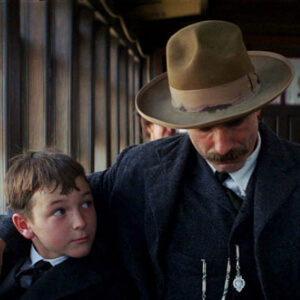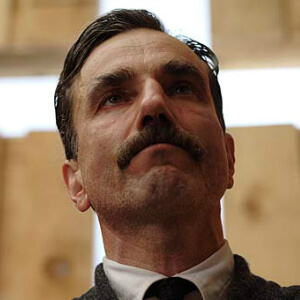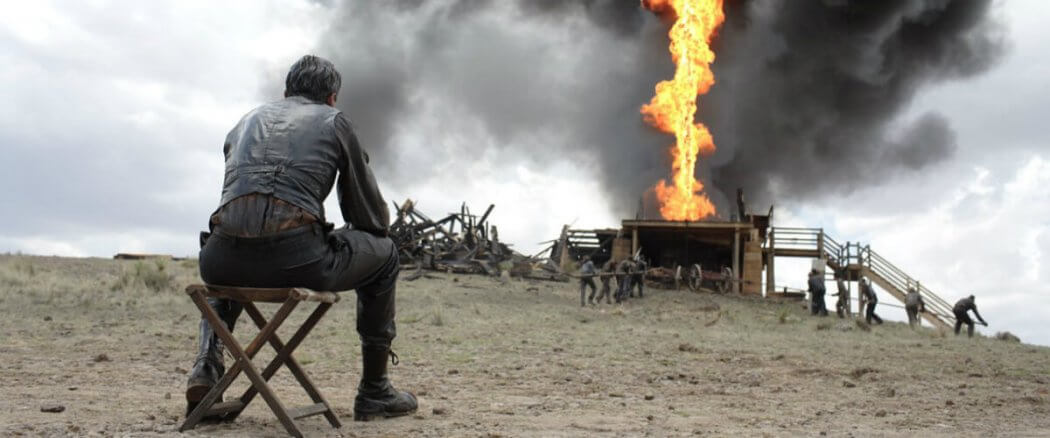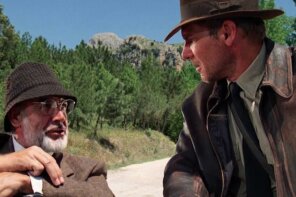There’s a moment in Paul Thomas Anderson’s 2007 epic There Will Be Blood where Daniel Plainview abandons control. The moments are sparse throughout the film, and one could even argue there aren’t any. But among the posturing and work and struggle, only once does Daniel Plainview betray his intentions in life, in work, in oil.
“I want to make enough money that I can move far away from everyone.”
He drunkenly admits this in a conversation with Henry, soon after his son, HW, becomes deaf. It’s a telling moment, one that confirms suspicions about his character, suspicions built through years of clawing through the dirt, smooth-talking and hard bargaining.
Here, Daniel Plainview sets out his one goal, a feat he spends years accomplishing — a place he ends up reaching.
Isolation.
Out of the Mine Shaft
Much can be made of the first several minutes of There Will Be Blood. It’s a wonder of cinematography and composition — visual and musical. In part, it’s memorable for the fact no words are spoken. Here, we’re introduced to Daniel in his earlier years. He spends these years in the earth, digging, pulling and climbing. He’s covered in soot and blood, scrapping for even the slightest bit of oil or silver.
It’s here that Plainview’s drive is established. In perhaps the most notable sequence, he falls into a mine shaft, seemingly shattering his leg. He wakes up barely breathing before finding a trace of silver rock. He pulls himself out of the shaft and crawls however many miles toward the nearest town.
 The first few scenes are helpful in knowing exactly how far Plainview will go to reach his goal, though we don’t know it at the time. But these first few scenes, ones where we see the death of Daniel’s partner and the subsequent adoption of HW, also establish Daniel’s humanity — or so one could call it at the time.
The first few scenes are helpful in knowing exactly how far Plainview will go to reach his goal, though we don’t know it at the time. But these first few scenes, ones where we see the death of Daniel’s partner and the subsequent adoption of HW, also establish Daniel’s humanity — or so one could call it at the time.
Daniel isn’t so interested in empathy with the plight of others as much as he is the appearance of it. People care about families, so naturally a single father who has built success for his family will be well-received. People care about church, so donating to the church keeps morale high, though Daniel’s issues with faith make this a perilous investment. More on that in a bit.
But in the end, Daniel is forced to show these actions as put upon airs, specifically as it pertains to HW. When HW is deafened by the explosion of Daniel’s well, life becomes difficult. Daniel is forced to care for his son out of sacrifice, not convenience. The obvious solution is to remove the distraction. That is until someone forces him to backtrack, solidifying Daniel’s hatred for him. That person is Eli Sunday, one of the two people in There Will Be Blood who are able to wrestle control from Daniel Plainview, if only momentarily.
“I’ve Worked People Over, and Gotten What I Want From Them”
Throughout the film, Daniel pitches himself and his oil-drilling operation in multiple settings: town halls, private homes, his own office. He always tries to use the same rationale: He’s an oil — not a business — man, who partners with his son and works with people he trusts. He won’t discuss royalties or offers them at lower rates, but he’s able to guarantee success and hard work. His bill of family and fundamentals seems like a fair price, and it always ends up working out. That is, until he meets Paul and Eli Sunday.
Paul Dano’s characters are the only people to ever get one over on Daniel. And really, it only happens once each. When we first meet Paul, he’s a shy, quiet boy who waltzes into the office of a wealthy oil man and demands money for information. Daniel bargains down. Paul’s response? He raises the price. In the end, he gets what he wants and more: $500, a visit from Daniel, and — in the end — a profitable share of the business.
 As for Eli, he uses different methods to get the upper-hand on Daniel. Knowing Daniel’s desire to get the Bandy tract, he recruits Bandy to the Church of the Third Revelation. From there, he convinces Bandy to let Daniel build on his land… if Daniel will join the church and submit himself to humiliation at (literally) Eli’s hands.
As for Eli, he uses different methods to get the upper-hand on Daniel. Knowing Daniel’s desire to get the Bandy tract, he recruits Bandy to the Church of the Third Revelation. From there, he convinces Bandy to let Daniel build on his land… if Daniel will join the church and submit himself to humiliation at (literally) Eli’s hands.
Speaking of that scene: It’s a seminal moment in the movie. You can view it two ways. When Daniel screams, “I’ve abandoned my child!”, it comes off as either genuine remorse or a moment of clarity: to win this struggle with Eli, Daniel must play the game. And in the end, Eli will pay dearly for it.
So what difference is there between the Sunday brothers? One knows when to cut and run. The other desires power over Daniel, power he won’t win without a fight.
“Just Give Me the Blood, Lord, and Let Me Get Away!”
Aside from the last scene, when Daniel forces Eli to stand up and confess that he is a false prophet and “God is a superstition,” Daniel’s views on religion are much more internalized, though not necessarily subtle. We see it in the way he talks to Mary and Mr. Sunday after finding out about the religion-driven abuse in the Sunday family. We see it in the way he rants at Eli and covers him in mud after HW goes deaf and Eli asks for money. And we see it in the way he offers grotesque amounts of money to avoid going to church with Bandy toward the end of the film.
Daniel Plainview is a man without religion, someone who clearly views belief in God as a way to control the weak. It’s one of the many hatreds he’s built up over the years. But is this hatred so much about his disgust of controlling people? Or is it the fact that he sees religion as a threat to his pursuits?
In his case, the Church of the Third Revelation poses a unique threat to Daniel’s journey toward isolation. His workers are encouraged to go to church instead of work. Eli threatens to usurp a semblance of responsibility for success when he asks to bless the well, and further threatens to uproot Daniel’s influence by claiming the lack of blessing caused the death of a worker. And in that all-important “salvation” scene, Daniel’s baptism surrounds him with love, support, and — in a crude way — some sort of family in the church. Here, Daniel finds his hell, surrounded by people he doesn’t respect or care for, placed here by a man he loathes.
“I’m Finished”
The last line of the film is the final brushstroke of Daniel Plainview’s lifelong painting.
When Daniel finally leaves the fields, we see how he makes the final push toward loneliness. He isolates himself in a spacious mansion, with naught but paid servants to keep him company. No one visits but his business associates. That is, except for two people, the only two people who would want to see Daniel. And Daniel must rid himself of these two people to truly accomplish his goal of total emotional isolation.
 The first is HW, a son who has grown up seemingly healthy despite his father’s toxic habits. But of course, it makes sense when he finally finds out that Daniel isn’t his real father. He’s just a “bastard in a basket,” but that seems better than the alternative, doesn’t it? HW is easily cast off by the confession, one it seems he’s been ready to hear for a long time.
The first is HW, a son who has grown up seemingly healthy despite his father’s toxic habits. But of course, it makes sense when he finally finds out that Daniel isn’t his real father. He’s just a “bastard in a basket,” but that seems better than the alternative, doesn’t it? HW is easily cast off by the confession, one it seems he’s been ready to hear for a long time.
Eli Sunday, however, is a different animal. In Daniel’s mind, Eli is the only one who ever truly bested him. Sure, Paul got what he wanted out of Daniel, but in Daniel’s view, he came out on top. Paul is successful, but Daniel is alone. Eli, though… Eli forced Daniel to embrace the unthinkable, to course correct. Eli has made Daniel’s life a hell, and the only way to return the favor is to undercut Eli’s worldview, and let him die in fear. It’s a horrific sort of revenge, the type only a sociopath would wish on his enemies. And in the end, Daniel finishes his pursuit of isolation by bludgeoning his enemy to death with a bowling pin.
But the journey, long and hard-fought, leaves Daniel tired, broken and without sympathy from the viewer.
“I Can’t Keep Doing This On My Own…”
If we go back to that scene with Henry, we can find another line where Daniel betrays himself. Where he admits this pursuit of being alone is foolish. He can’t keep going on by himself. He needs someone else.
Ever since its release, There Will Be Blood has been viewed as a fable. It’s about the dangers of ambition and greed. It’s about the evils of capitalism. It’s about fathers and sons, and how pivotal those relationships are in human development.
But I would argue Daniel Plainview’s story is also a picture of true loneliness and how it drives us to madness.
Proverbs warns of the dangers of isolation, specifically in chapter 18: “Whoever isolates himself seeks his own desire; he breaks out against all sound judgment” (v. 1). And the Koheleth in Ecclesiastes 4 says, “Woe to him who is alone when he falls and has not another to lift him up.”
Perhaps that’s why the final shot of There Will Be Blood is so powerful. Daniel Plainview, builder of an empire, lies alone in the basement of his mansion, spattered in the blood of his own family. He has no one, and even if that was the goal the whole time, how could we possibly wish to endure a similar fate?





